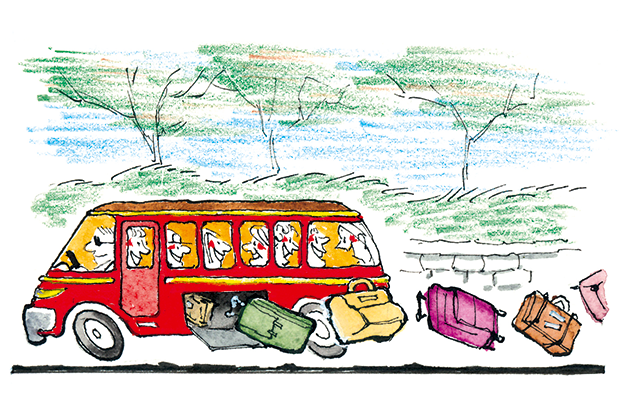As the 16 of us huddled in the back of an open-air truck teetering off the Andes, I closed my eyes and thought of my mother. The joke email I had sent days before, with the subject line: ‘Urgent: your child is in hospital’, didn’t seem so funny now we were taking tight corners along a mountain edge. Even if we did survive our Peruvian trucker’s alarming driving down steep winding roads, there was every chance the police would stop the vehicle and find a bunch of Scottish teens in the cargo container where there should have been animal feed.
It wasn’t supposed to have turned out like this. My school’s three-week expedition to Peru — back in the summer of 2006 — had been pitched to parents as the perfect way to boost their children’s CV by laying the groundwork for a Duke of Edinburgh award. For the alternative kids, it was also the only option available after a lack of sporting ability had ruled out the Australia hockey and rugby tour. While the jocks sweated it out on the field, we would find purpose and meaning in South America.
The itinerary was set; our days would be spent on nature trails in the jungle, trekking the Andes and volunteering with local communities. But once we arrived at our first stop in the Amazon, the six months of preparation proved irrelevant. We misplaced passports, forgot insect repellent and turned beetroot red in the heat. While our jungle hosts actively sought out caimans and anacondas, we screamed and cowered when a rogue tarantula infiltrated the mosquito nets. Yet it was another eight-legged foe that posed the biggest threat. Packing our rucksacks on the last day in the jungle, a friend turned over his mattress to discover he’d been sleeping on top of a deadly spider and its eggs. Our teachers twitched nervously, hoping the story wouldn’t make it into our postcards home.
That day we left the Amazon and headed for the dizzy heights of the Sacred Valley, the heart of the Inca Empire. On landing, we quickly discovered the big perk of altitude for all teens: our alcohol tolerance had gone right down. It was now possible to get hammered on a half-pint.
The downside of living at 10,000ft was altitude sickness. In order to avoid this fate, we tried to acclimatise by drinking coca tea and adopting a laissez-faire approach to our work, which was painting the local hacienda. On one of these nights a classmate came down with the sickness. Although we had been lectured about symptoms, she had neglected to tell the teachers that she was coughing up blood. When her condition worsened she was rushed to hospital. The rest of us huddled round a campfire and cried. As we shared our worries, we began to forgive one another for all the infighting over lost IDs and insect repellent.
Thankfully she made a good recovery and it was decided that we should press on with the trek. With a guide, and donkeys to help with the bags, we would get up at dawn to walk to our next stop in time to pitch the tents before dark. Even without bags, the height made us feel like we were carrying heavy loads.
As the days went by, many of us developed injuries and colds, and the slower walkers began to lose morale. Concerned that more of us were showing signs of altitude sickness, our two teachers made the decision to bring the walk to an early close. Our guide led us to the nearest mountain village, where we found a restaurant from which we could make a plan. While we had made it back to civilisation, getting back to Cusco proved to be no easy feat. There was a weekly bus which had arrived and left the day before.
Thinking on her feet, my biology teacher convinced a trucker to let us all sit in the back of his open-air truck and head back to the city. He agreed on condition we ducked down and didn’t make a sound. We swung down spiralling mountain roads at great speed. Since we couldn’t raise our heads to see what height we were at, our imagination relied on hearing the screeching of brakes as we approached the next steep turn. It was a reminder that our fate hung in the balance. Back on lower ground, we stayed down low as the police stopped by at the same petrol station as us.
That night we arrived at Cusco safely and went on to enjoy a blissful few days in relative luxury, with hot water and tropical juices on tap. We laughed over pints of Cusquena and made light of the adventures we could tell our friends about, but it’s safe to say that the worry lines on our teachers’ faces never quite disappeared.







Comments